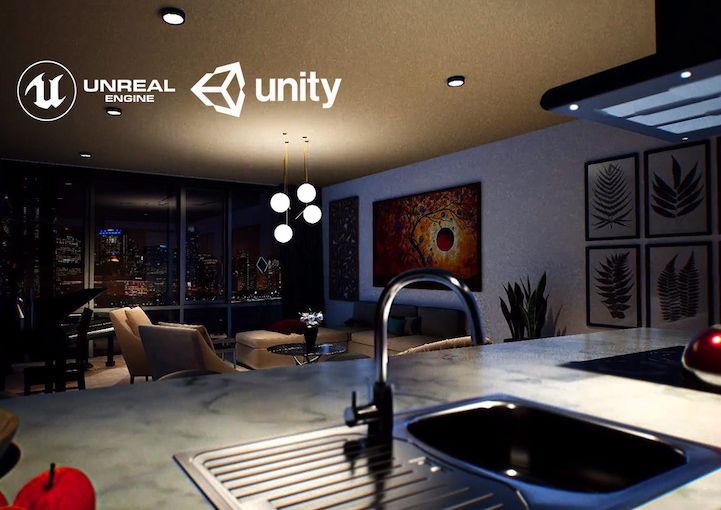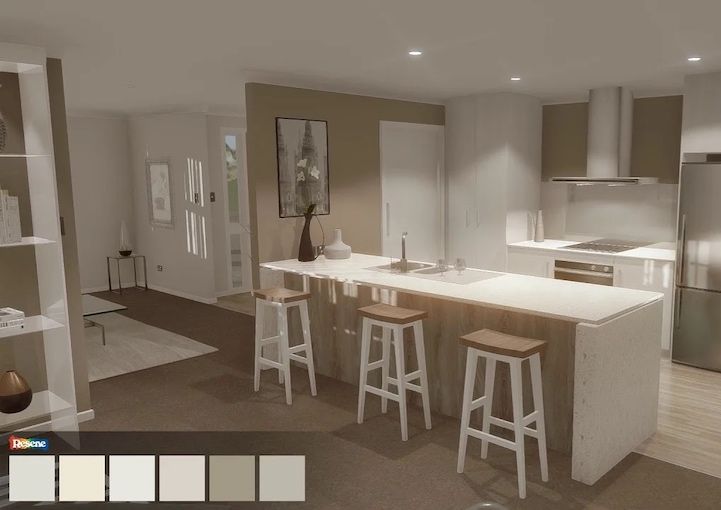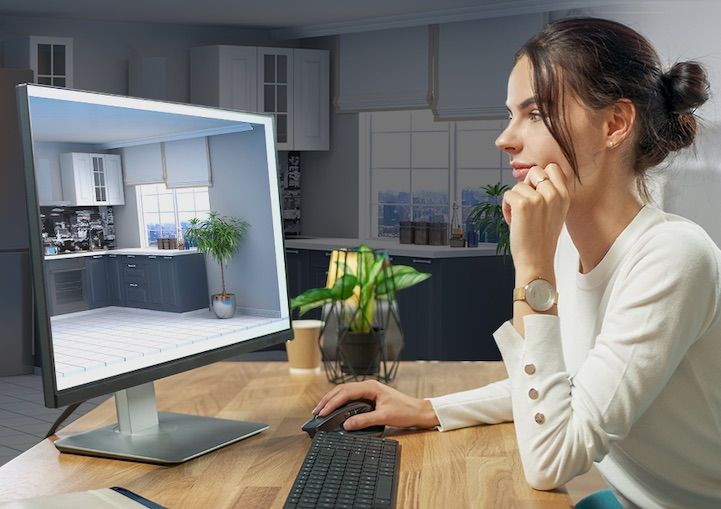The metaverse will be worth an estimated $800 billion by 2024. It offers the architecture, engineering, and construction (AEC) industry several opportunities to connect with their market and make money in the metaverse. Today, AEC professionals use 3D models and visualizations to help clients see what’s possible. Tomorrow, the metaverse will allow their clients to interact with what’s possible.
We chatted with David Weir-McCall, Business Development Manager with the AEC enterprise team at Epic Games, to understand AEC’s future in the metaverse, what the challenges and opportunities are, and how the kids hold the key to the future of interaction and commerce.
PureWeb: What do you do within the AEC enterprise team at Epic Games?
Weir-McCall: Our primary role is to support our customers, our users of the Unreal Engine, in how they are adopting real-time technologies within their AEC workflows, and that's everything from visualizations all the way through to digital twins.
PureWeb: Analysts project that the metaverse is going to be worth $800 billion by 2024. There are a lot of factors that stand in the way of widespread metaverse adoption. How can AEC companies start making money in the metaverse immediately?
Weir-McCall: It will be where there are already transactions happening in the space. So, let's imagine the easiest areas, such as real estate, where you have physical assets. There are also digital assets of those physical ones that we use in sales and marketing and configurations. So, can these digital assets have a part to play in the metaverse and facilitate or enhance sales? For example, with every apartment sold, maybe you could get a fully functioning digital twin of your space and your environment in that place. I think the easiest thing to do is look at where and how we currently operate and try to figure out how we can adopt that in a digital world.
PureWeb: So, the immediate opportunity is real estate, but then there are going to be all of these cool add-ons. Is there anything on the furthest end of the spectrum you see happening?
Weir-McCall: We can go all the way to the very beginning of the architectural process where there are ideas and early design concepts. An area that could be explored down the line is test running ideas by loading models into your space and allowing people to explore, so you can gather real time feedback from a global audience. What I love about not having this solidified version of a metaverse is that the possibilities are there to address any part of the AEC process.
PureWeb: Do you think there will be discreet stages to the metaverse? With the internet, we went through different stages where it was academic, then corporate, then a tech enthusiast’s playground. And then the general population got onboard thanks to social media. Now we're all on here and we're shopping, banking, interacting, and more. Do you think there are different stages of the metaverse? And if so, what stage do you believe we're in, particularly from an AEC perspective?
Weir-McCall: This is totally biased, because I come from Epic, but I think at the moment we’re getting “technology-ready” for the metaverse. I think that it's great having ideas and visualizing potentially what it could be. I think the path to enable it just through technology alone is the big question. That's why we are enabling creators to create content for whatever that looks like and making it as seamless and as streamlined as possible. So, if there is going to be this metaverse and we want to get 3D content on there, it shouldn't be limited to just a few people or to specialist companies. It should be open and available to everyone. So, from a technology standpoint, we're in this phase where we're trying to streamline that process and get the tools into more hands to allow for that integration of this mass adoption down the line, whenever it is.
PureWeb: Does the following analogy make sense: In the nineties to early aughts, if you wanted to build a website, it was this big, arduous process where you had to pay somebody but now there are all these really cool tools and shortcuts where you just go on WordPress and build something. Is that what you’d say is happening right now? The building of the “WordPress of the metaverse”?
Weir-McCall: Yeah. It is about building the tools. Everything from applications to the actual format of how it'll translate across to the file format. It is a very good analogy. That web design used to be up to the C++ or Python coders or JavaScript coders. Now, I can make a website with my very limited knowledge of anything to do with websites. And that's the kind of thing that I think people are going to be looking for as they move forward.
PureWeb: Much of the literature about the metaverse focuses on potential use cases or companies and gaming platforms that are starting in the metaverse. What advice do you have for large established companies in the AEC vertical? AEC companies that didn't start in the metaverse and who’ve been around for decades and want to start experimenting in this space. What's your advice for them?
Weir-McCall: I think the best thing is to look at the digital assets that you currently have at your disposal, and how they could play a part. I think what is very unique about the AEC is that for the last decade or so, we've been working in 3D. We have for the longest time. For everything from BIM – creating the 3D models which are packed with information like cost analysis, data material, quantities – all the way through to the visualization side. Companies in the AEC industry already have that upper standing or first step, because they have those assets. They’re rich in those assets. The problem is that they’re not doing anything with those assets. So, the first thing to do is think, “How can I change something I'm doing now to something that could be, or might be, useful in the future?
PureWeb: What would be the first step towards making a mental inventory of those assets? Is it hiring certain people? Do the existing people within an AEC firm already have the hard skills to make that jump? What would be the first thing they do?
Weir-McCall: You’re starting to see that happen organically. I think digital roles within architecture firms started to come around about five or six years ago. My role before coming to Epic was in an architecture firm. The digital technology specialist job I had was not around when I graduated. I think that the firms and the industry at large are already starting to shift towards understanding that we need a broader range of skill sets and talents including software developers, game designers, coders, design specialists, and more. So, this is definitely what's needed and thankfully what's already happening.
PureWeb: Right now, the AEC and the metaverse conversation largely revolves around using the metaverse to sell real world spaces. Do you see a future market for purely virtual spaces?
Weir-McCall: Yes. There are a number of different areas where I think we can. To take a step back, one of the interesting things I love is how virtual events are all very seated in reality. What I mean by that is you'll go into a conference room and there are virtual tables and chairs. But why is there a virtual chair? No one's actually sitting down, and you don't need the chair to sit virtually. At the same time, we don't have conferences where you're flying around in space and sort of jumping between star constellations because for us to be rooted and grounded in an experience, it needs to be very familiar to us. It needs to be done in such a way that we can understand how to interact and how to move around. There's huge importance placed on the element of designing digital spaces, along with the way that we design physical spaces because of how we appreciate those spaces. Whenever you're in a well-designed architectural space, you know you're in a well-designed architectural space. And you know whenever you're in a very poorly designed architecture space. And I think those biases and that awareness that we have will filter through to the digital world and we could easily walk into a place and go, well, this lighting is terrible, this feels claustrophobic.
PureWeb: What's been the most surprising lesson that's emerged from your conversations with AEC professionals exploring the metaverse?
Weir-McCall: I think the most important part has been that human connection, and it’s how we develop our tools at Epic Games. You can make something very pretty and very visually appealing, but the message around it and the kind of collaboration around it falls dead unless you build methodologies around being able to do that. So, things like pixel streaming, which you guys do very well, is bringing people together virtually from across the world. That is so important, not just to have one person in a space, but to have more than one person in a space. So, I think what we're really learning is that what matters is: How do we work better in these spaces? How do we collaborate in these spaces? How do we come together in these spaces? And that is the infrastructure that's getting built now that we're starting to work further on and get beyond just the visualization piece.
PureWeb: What are the risks for companies who want to experiment in the metaverse? We’ve heard that some are worried that a failed experience could hurt their brand reputation. Do you think that this is a valid concern? If not, why not? And if yes, how can companies mitigate this risk?
Weir-McCall: I think if you have control over how your designs or how your models are interpreted by other people and you have full creative control of that, then you won't be disappointed. Whenever you hand your product off to someone else for them to do something with it, that's whenever you're going to lose creative control and then you're going to start having more problems. It’s about creating content creation tools for the creator so you are in more control, so you can choose how the person on the other side witnesses and experiences it. And as long as you have that custom control, I think that possibility of hurting your brand reputations is going to be reduced.
PureWeb: Some critics worry that the metaverse will have a detrimental effect on society and that people will just check out of their real lives and spend all their time in their virtual lives. And others might argue that this has already happened with the internet. We come home, then we zone out with our phone or our video game. Do you think the metaverse is an unavoidable and natural next step for commerce and relationship building? Is there any stopping its progression?
Weir-McCall: We kind of associate things like social media or even like the gaming environment as being detrimental to society's ways of communicating or interacting. What I find hilarious about this is that we have this huge generation gap where younger people have grown up interacting in virtual spaces and talking in virtual spaces. For example, Fortnite has 600 million users. Arguably, they feel as comfortable, if not more comfortable, communicating with people across the world, in these 3D spaces. Whenever they grow up, that's going to be natural to them. Whereas Zoom may feel very unnatural to us and makes us say, “Oh, this is terrible. I just want to meet someone face to face” the generation behind us doesn't feel that. It's very easy for us to say it's taking away the value of life or the value of the way that we do things. I don't believe that. I think it's evolving and changing, but it's not bad. I think it's actually going to be very good for us. Today, I can speak to someone on the opposite end of the world with very little resistance and I think that opens up a lot more potential than it does damage. We see this generation that is interacting, building, designing, and watching movies in virtual spaces, and that's normal and great for them, and we as the older generation need to get on board and say, “This is actually a very cool way of doing things and, and it's not bad, it's just different.”
Ready to see what real-time 3D technology can do for your business?
Have an interactive 3D project you want to distribute from the cloud? Curious about Pixel Streaming or Render Streaming? Contact us to learn more about PureWeb and get a complimentary consultation with one of our specialists.



